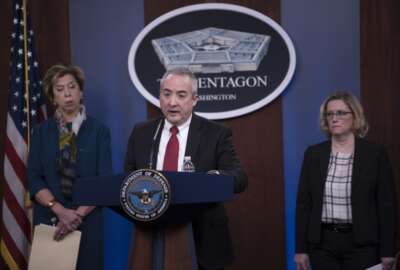

OMB released much-anticipated guidance giving agencies important direction for how they should implement the provision in the stimulus bill that lets agencies pay...
If there is one thing nearly every federal agency has experienced over the last 75 years, consistent application of laws, regulations and policy is a grueling and, unfortunately, many times a futile effort.
It’s more due to human nature than something malicious or purposeful.
Despite the history of inconsistencies, vendors are calling on the Office of Management and Budget to take the reins of this 111-agency horse drawn wagon and ensure some consistency in how agencies implement a specific section of the stimulus bill.
Section 3610 of the Coronavirus Aid, Relief and Economic Security Act (CARE Act) lets agencies pay contractors to keep them in a “state of ready” if they can’t work because of the pandemic. The provision is not a mandate nor does it guarantee payment, but it gives agencies broad latitude to count paid leave as a reimbursable cost.
This is why nine associations last week called on OMB to release governmentwide guidance on how agency contracting officers should interpret the provision.
“Consistent implementation of this provision is critical to the viability of the hundreds of thousands of companies that make up our nation’s critical infrastructure and defense industrial base supply chains,” the April 16 letter states. “Companies require clear and consistent guidance to protect their employees, maintain a ready state and make critical resource and personnel decisions tied to support for customer missions.”
OMB released that much anticipated guidance the next day — to be clear not because of the letter as we all know memos take days, if not months in some cases, to develop — giving agencies important direction.
“The Office of Federal Procurement Policy (OFPP) has developed guidance to help agencies make rational business decisions that balance the need for contractor resiliency with the need for good stewardship,” OFPP Administrator Michael Wooten said in a statement.
In the guidance, OMB details several guiding principles for contracting officers, including the starting date of when agencies can start reimbursing vendors’ costs — March 27 — to ensuring funding is available before committing to payments to paying the actual amount but not more than the minimum applicable contract billing rates for up to an average of 40 hours per week.
“Contractors must fully support and maintain documentation for claims made under section 3610. Agencies are encouraged to work with their contractors to understand how they are using or plan to use the relief provisions available to them under the CARES Act and the Families First Act to address the health and economic hardships created by COVID-19,” OMB states. “In some cases, provisions other than section 3610 may provide a more efficient means of getting payment into the hands of contract employees. In other cases, a contractor may find it beneficial to take advantage of a combination of resources. For example, a business may wish to use the Paycheck Protection Program (PPP) established pursuant to sections 1102 and 1106 of the CARES Act for certain relief and request agency support under section 3610 for other relief. For this reason, it is important to secure fully supported documentation from contractors regarding other relief claimed or received, including credits allowed, along with the financial and other documentation necessary to support their requests for reimbursement under section 3610.”
This is OMB’s second memo aimed at helping vendors plan and stay ready during the coronavirus pandemic.
OMB’s guidance comes after both the Defense Department and the Office of the Director of National Intelligence released their own guidance to implement 3610.
And this is where vendors begin to get stressed. For example, both the DoD and ODNI guidances say military services and agencies and intelligence community agencies can reimburse contractors, if they deem it to be necessary, for lost time starting Jan. 31.
OMB’s memo, however, says agencies can reimburse for lost time starting March 27.
This is one of those inconsistencies that vendors believe need to be addressed.
While vendors, generally speaking, praised OMB for the memo, the variations on the rules, such as the starting date, has not satisfied many of their concerns.
“Unfortunately, OMB’s current guidance stops short of setting clear standards for consistent, governmentwide implementation of Section 3610, and fails to address many of industry’s specific questions and concerns about reimbursement,” said Gordon Bitko, senior vice president of policy for the public sector at the IT Industry Council, in a statement to Federal News Network. “OMB explicitly recognizes that its guidance will result in different applications of 3610 authority across the federal government, and potentially even among individual buying offices within the same agency. Navigating these different approaches places significant burdens on individual contractors at a time when resources are already strapped.”
OMB states in its memo that the variations of 3610 will be based on different missions, requirements, contracts and funding situations.
“Application of these guidelines will support rationally based decisions that reflect the best interest of the government in any given situation, fully supported by contractor records that are subject to oversight, and that safeguard the taxpayers funding these efforts,” the memo states.
Larry Hanauer, vice president of policy for the Intelligence and National Security Alliance (INSA), said now that OMB’s guidance is out, agencies have to use it to streamline their processes.
“In order to reduce confusion and simplify bureaucratic requirements, INSA urges government agencies to implement the CARES Act legislation in a consistent, uniform manner,” he said. “We were pleased that OMB’s guidance properly emphasizes the importance of ensuring that federal contractors–who represent roughly 30% of the total government workforce–remain resilient. It directs agencies to use available funds and interpret contracts liberally. It also addresses the need to support national security contractors working in classified environments. Contractors supporting classified projects cannot bring work home with them, and many cannot access secure facilities due to office closures or social distancing requirements. The OMB memo makes clear these contractors should be paid to remain in a ready state so they can return to work at the earliest possible opportunity.”
More details from OMB seem to be on the way. OFPP said it will provide updates and additional information, including additional “frequently asked questions” as needed.
“Generally, OMB has tried to set out a consistent process for evaluating the application of Section 3610. A clear, consistent process on which vendors can rely is critical for vendors seeking to understand and perform in this environment,” said Roger Waldron, the president of the Coalition for Government Procurement.
Copyright © 2025 Federal News Network. All rights reserved. This website is not intended for users located within the European Economic Area.
Jason Miller is executive editor of Federal News Network and directs news coverage on the people, policy and programs of the federal government.
Follow @jmillerWFED



